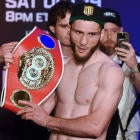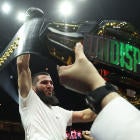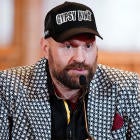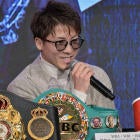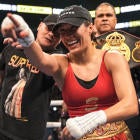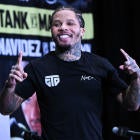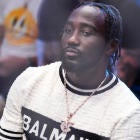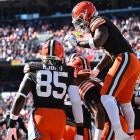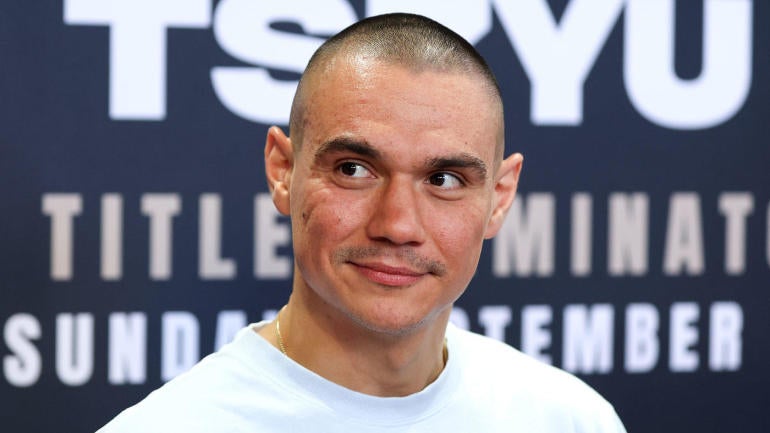
When former 154-pound titleholder Tim Tszyu looks back on the lone defeat of his pro career in March, when he dropped a split decision to Sebastian Fundora in their pay-per-view unification clash, an unmistakable spark of excitement begins to twinkle in his eye.
As far as moral victories go, this one is about as good as it gets. Yes, Tszyu (24-1, 17 KOs) technically lost both his WBO title and unbeaten record on the same night. But seeing the result on paper doesn't even begin to tell the complete story.
Fundora (21-1-1) replaced Tszyu's original opponent, former two-time welterweight champion Keith Thurman, on just 12 days' notice. And after Tszyu appeared to be on his way to stopping Fundora through the opening two rounds, an errant elbow opened up a vicious cut on the hairline of Tszyu that caused blood to flow down his face and obstruct his vision for the next 10 rounds.
Had Tszyu bowed out of the fight after the cut was suffered, it would've been ruled a no contest. Even a few rounds later, had the 29-year-old Australian told the ringside doctor he could no longer see, Tszyu still would've claimed a close victory via technical decision.
It turns out, that's just not the way Tszyu operates. And when asked ahead of Saturday's return, when Tszyu headlines a PBC on Prime Video (8 p.m. ET) tripleheader by challenging IBF champion Bakhram Murtazaliev (22-0, 16 KOs) at the Caribe Royale Resort in Orlando, Florida, whether he regrets the decision to keep fighting, Tszyu couldn't have been more absolute in his answer.
"No, I don't [regret it] because I got to show the world who I am and something like that is priceless," Tszyu told CBS Sports in September. "I think it's a good feeling to be able to walk around and people are giving you props. But it's what you go through and respect is what I'm all about. Of course, I appreciate it and it means the world.
"It's kill or be killed, as they say. That was my mentality in there, to win in significant fashion or go out on my stool. I guess it was a tough little scenario but when I was able to pull through a little bit, I was able to pick it up a little and show what I'm truly made of. I've got a nice little 'V for Vengeance' [scar] now tattooed on my scalp. Everything is well and I can't wait for the revenge, basically."
Tszyu's romanticism of boxing's warrior culture didn't come without a price throughout the rest of the Fundora fight. The blood flowed relentlessly into his eyes, creating a never ending stinging sensation that led to constant double and/or blurry vision, opening up the door for the 6-foot-5 Fundora, who showed an equal level of heart in this bloody war, to claim a razor-thin victory.
"That's what I probably regret the most, the fact that I did figure [Fundora] out and I felt comfortable and strong but I wasn't able to keep it going," Tszyu said. "As soon as the cut happened, it sort of rattled me a bit. I was in my head and not thinking about the fight anymore, I was thinking about this cut. That's where I lost the concentration."
Tszyu's legendary father, Hall-of-Famer Kostya Tszyu, watched from afar in his native Russia and wasn't happy with what he saw. This was the same fighter who famously chose not to come out of his corner before Round 12 of his final fight -- an IBF 140-pound title defense against Ricky Hatton in 2005 -- despite being close on the scorecards out of fear for his own well-being after retirement.
"He was a bit spewing, and I don't blame him," Tszyu said of his father's phone call after the Fundora fight. "I remember him saying when he retired that the only reason he did was because he didn't want to die in that ring. When I was fighting Fundora, I was ready to fight in that ring. That's what made me click that I'm the warrior and the fighter and I'm not ready to retire."
Although Tszyu has been physically estranged from his father ever since his parents divorce, which led Kostya to move back to Russia and start a new family, the two talk regularly. But it was Tszyu's first loss that opened up a bridge to make a much deeper connection between father and son.
Tszyu and his father traveled to Thailand together after the Fundora fight to train and talk about both boxing and life. And this weekend, for the first time since Tszyu's 2016 pro debut in Sydney, Kostya will be in attendance for his son's fight.
"My dad hasn't been around the boxing game but the boxing game has been around my dad and the family," Tszyu said. "So, I feel like this is a big moment for me to see him experience that nostalgia and have that same feeling. We live and breathe this sport and I want him to feel that. I think a big part of it has been him in Russia letting us do our own thing. I always said I wanted to be my own identity and I think he respects that.
"He's not coming in [to Orlando] as Kostya, he's' coming in as the father. He wants that feeling as a proud father."
All Tszyu has to do now is get through Murtazaliev, a 31-year-old native of Russia who upset Jack Culcay on German soil via 11th-round knockout in April to claim the IBF title despite enduring both training camp and the fight while observing Ramadan as a practicing Muslim, which meant fasting during daylight hours and training overnight.
With a win, Tszyu could put himself in position for a number of big-name fights at 154 pounds, including against the likes of Terence Crawford, a Fundora rematch, Errol Spence Jr., Jermel Charlo or Vergil Ortiz Jr.
"[Murtazaliev] has the Soviet style and the Soviet mentality," Tszyu said. "It's something that I grew up [around] so I know what he brings, the toughness and basically the dog in him. It's going to be two pitbulls going after it and it's always a fan-friendly style when you see two clashing like that.
"But, hopefully, no blood this time on my side. I'm coming in red hot right now. My hands are itchy and I'm ready to go."








